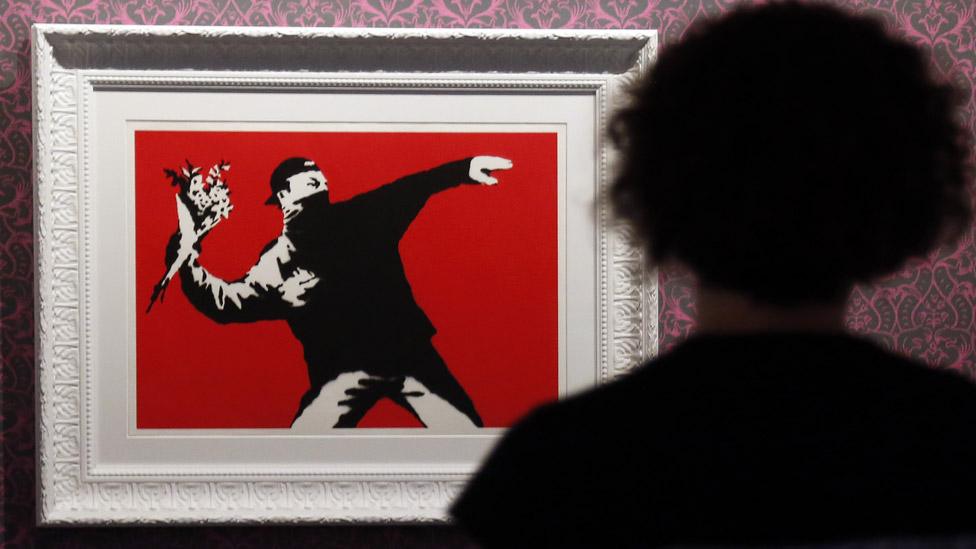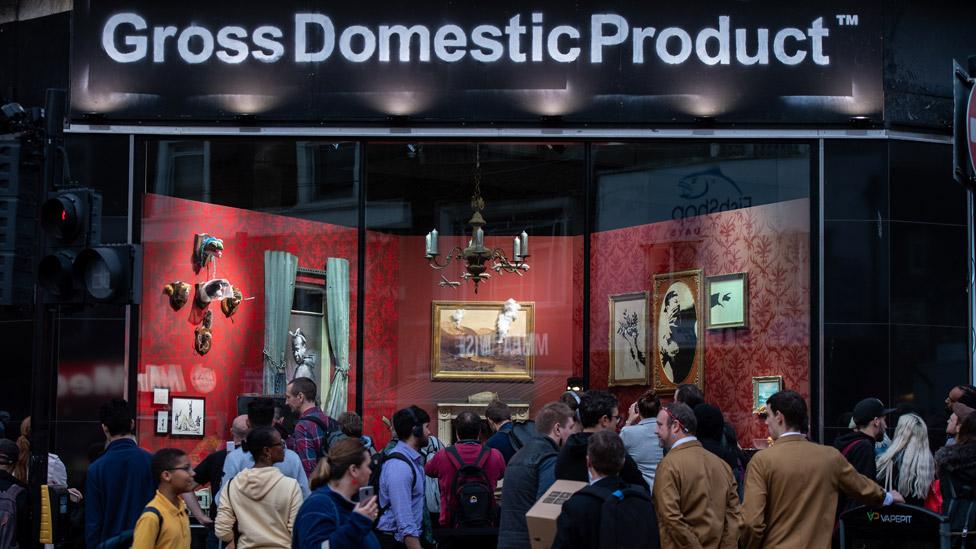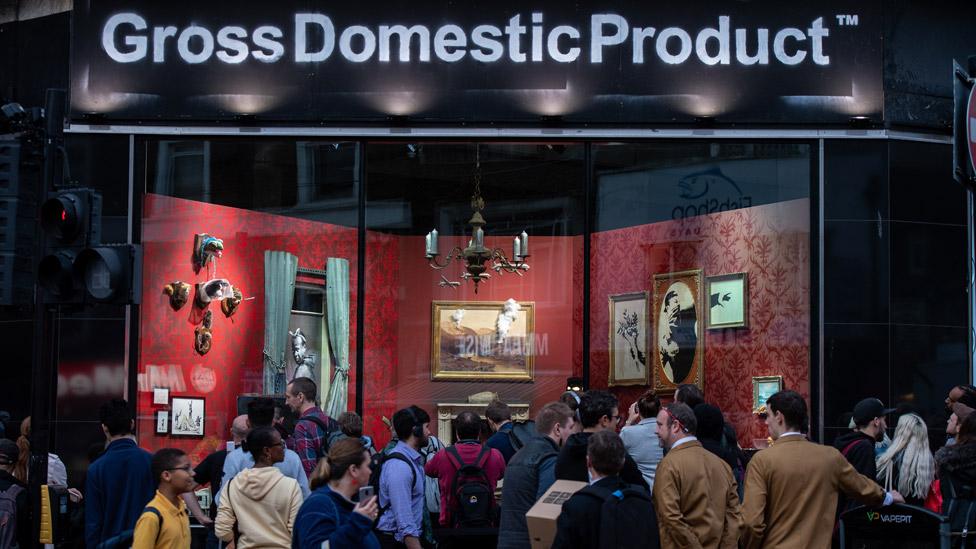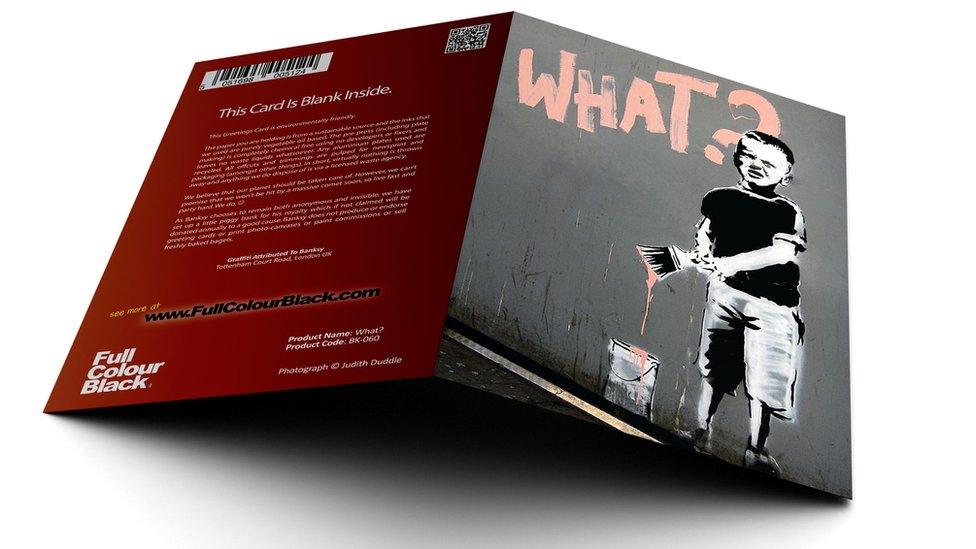Banksy loses battle with greetings card firm over 'flower bomber' trademark
- Published

The image has become one of Banksy's most famous works
Banksy has lost a battle with a greetings card firm over the trademark of one of his most famous works.
North Yorkshire-based Full Colour Black challenged the artist's right to trademark his image of a protester throwing a bunch of flowers.
The European Union trademark office has thrown out his trademark and accused him of being "inconsistent with honest practices" when trying to protect it.
For a trademark to be valid, the holder must sell goods using the image.
But the authority said he had filed it in order to avoid using copyright laws, which are separate and would have required the famously elusive Bristolian artist to reveal his true identity.

Banksy said he created an online store and shop front in 2019 to try to fulfil EU trademark law
Banksy first sprayed the picture on a wall in Jerusalem in 2005, and his company applied for the trademark in 2014.
It must be used within the first five years, but the EU Intellectual Property Office (EUIPO) said he hadn't sold merchandise or other items using the image until Full Colour Black challenged the trademark in 2019.
Only then did he set up an online store and a shop front in Croydon, south London, explaining that he had been "making stuff for the sole purpose of fulfilling trademark categories under EU law".
The EUIPO said it was "clear that Banksy did not have any intention" of using the trademark when he filed it, and that in 2019 the goods he sold "were created and being sold solely" as an attempt not to lose the trademark.
'Copyright is for losers'
"His intention was not to use the mark as a trade mark to commercialise goods and carve out a portion of the relevant market, but only to circumvent the law," the ruling said. "These actions are inconsistent with honest practices."
The EUIPO also said he had applied for trademarks in order to have legal rights over his works without having to resort to copyright law.
"Banksy has chosen to remain anonymous and for the most part to paint graffiti on other people's property without their permission rather than to paint it on canvases or his own property," it said. "He has also chosen to be very vocal regarding his disdain for intellectual property rights."
The ruling quoted from one of his books, in which he said "copyright is for losers".
Full Colour Black's lawyer Aaron Wood of the firm Blaser Mills told BBC News the greetings card company was "very pleased with the outcome".
'Banksy's entire trademark portfolio is at risk'
He said: "Banksy has always taken the view that copyright is for losers, and if he ever wanted to contest somebody using an image, he would usually need to rely on copyright.
"The problem for Banksy using copyright is he would have to come out of the shadows. He would have to say, 'Here I am, I created the work.' And in doing so he would lose that shroud of anonymity. So he doesn't do that.
"But anyone can file a trademark, so Banksy's corporate entity filed a trademark for this artwork. A trademark can last forever, it's a perpetual monopoly. Whereas copyright only lasts a certain period of time and he'd have to come out of being anonymous, if he relied upon the trademark he could stay anonymous and he could do it for ever more. And that we thought was not a fair state of affairs."
The company has challenged the trademarks of a further six Banksy works, and is now likely to contest more.
"In the nicest possible way, Banksy's entire trademark portfolio is at risk," he added.
'No intention of using it as a trademark'
Banksy's representatives have not responded to a request for comment.
Copyright and trademark expert Liz Ward, principal at Virtuoso Legal, said it was "a very unusual case" because most artists rely on copyright law to protect their work from being used without permission.
"With copyright, if you were to sue somebody, you'd have to put your name on the claim form," she told BBC News.
"It's quite clear that Banksy, although he registered a trademark, had no intention of using it as a trademark.
"Most trademark owners register a brand name or logo because they're going to make it theirs. They're going to say, 'If you buy a pair of trainers with Nike or Puma on, you know you're getting good quality.' That's why trademarks are so valuable. Banksy didn't create a trademark to make it a business asset."

Follow us on Facebook, external or on Twitter @BBCNewsEnts, external. If you have a story suggestion email entertainment.news@bbc.co.uk, external.
- Published17 October 2019

- Published4 October 2019
